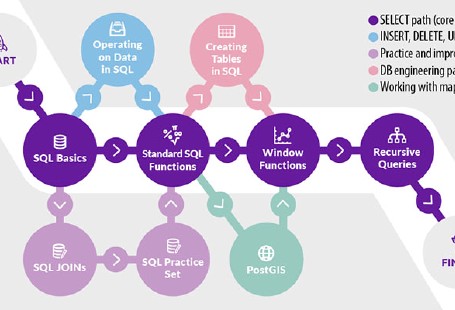Tired of Conferences? Grow with eLearning!

In the face of a constantly changing labor market, the concept of lifelong learning has become more important than ever. Humans continue to evolve, so any professional wishing to be on a roll should stay up-to-date with technological trends. But how does one do that conveniently?
Let’s face it: no industry is stable. No matter what your profession is, your environment is continuously undergoing processes that redefine the game. New players enter the market, consumer trends change, technology creates new opportunities—there are thousands of examples proving this reality. As such, it’s rather naive to think that, once acquired, your initial competences will be an adequate foundation for your professional activities until you retire—especially now, in the twenty-first century, when technological advancements impact everything we do.
You might be thinking: easier said than done. After all, attending conferences, taking stationary courses, and reading tons of valuable books is time-consuming and does not necessarily fit one’s clearly-defined needs. Fortunately, there is a solution: eLearning. Let’s explore what it is and what are its advantages!
eLearning: a Modern Approach to Education
eLearning is an alternative to the traditional, stationery education that requires the learner’s physical presence in a classroom, conference, meetup, etc. It may take various forms; the most popular one is structured online courses. In this method, the learner doesn’t attend class in a specific physical location. Instead, he or she simply enters an eLearning portal and gains knowledge independently of other course participants. The entire process takes place on the web, but there is an exception: blended learning that mixes online and offline activities. However, this option is not as popular.
As the availability of the Internet across the globe rises, online courses are becoming increasingly popular. Indeed, the eLearning market is predicted to hit $325 billion by 2025, which means that its value is going to double in just a decade.
Online vs. Offline Learning
As stated before, online courses were invented as an alternative to stationery courses. Both forms have their pros and cons, but let’s just say that eLearning addresses the problems of today’s professionals better—in some aspects, at least.
Still, stationery courses are helpful because they give you the chance to listen to highly-skilled experts and ask questions if needed. Moreover, they may be used as a business network opportunity since they gather professionals of similar backgrounds and fields of interest. Finally, they are an excellent source of motivation. Firstly, they force you to, well, attend them and spend a specific amount of time on site. Secondly, the presence of other serious learners may inspire you to put some effort into your training as well.
Nonetheless, when you take a stationery course, you should expect several school-like problems:
- The learning process is not personalized, so the pace of learning will not necessarily meet your needs.
- You won’t have a chance to focus on specific areas or skip the ones you’re already proficient in; similarly, you won’t have a chance to come back to selected topics to do a recap.
- As is the case with university lectures, stationery courses tend to teach theoretical lessons. (No wonder: it can be methodologically challenging to perform practical exercises in a group as the more students in the classroom, the harder it is to keep control over them.)
- Finally, it’s costly, and you won’t persuade your boss to pay for everything you come up with (good luck if you want to switch industry!).
Why is eLearning Effective?
Online courses are so popular these days precisely because they address the problems learners deal with in stationery courses. We could say that eLearning is a “perfected” version of traditional education; however, it still has several flaws that could be eliminated.
The advantages of online courses include:
- Personalisation: Online courses let you adjust the learning experience to your needs (i.e. learn at your own pace, repeat selected topics, and skip what you’re already familiar with, etc).
- Practicality: Online courses tend to be much more practical than stationery ones as they usually feature exercises (technically speaking, it’s easier to include them in an e-course); moreover, select learning platforms provide learners with printable materials and handy cheat sheets,
- On-demand access: In eLearning, you are not dependent on the lecturer’s schedule—you can start your course and continue learning when you feel like it (just like a Netflix series)!
- Convenience: You can learn online anywhere, so you don’t have to attend any particular spot—a coffee shop will be as good as your desk,
- Cutting down costs: Simply put, eLearning is significantly cheaper than stationery courses; the distribution of online resources generates fewer costs than hiring a trainer, booking a conference room, printing materials, etc.
As for the disadvantages:
For starters, you miss the chance to meet other professionals from your industry, so networking can be difficult to do. Also, eLearning requires self-motivation as no one monitors your pace or regularity. Because of this reason, after choosing an e-course, you should define your goal and know how to achieve it.
What to Look for in an Online Course?
As eLearning grows in popularity (in the corporate environment, it was reported to grow by 900% between 2001 and 2017!), so too have the number of platforms offering eCourses. To save money and time, it’s good to know in advance what to expect from online courses.
Single-field specialization
As the saying goes, if you’re average at everything, you’re good at nothing. You wouldn’t look for top-class rock climbing equipment on supermarket shelves, would you? Similarly, it’s better to find an eLearning platform that specializes in a certain topic (e.g. computer science, design, marketing, or psychology) rather than pay for an all-in-one solution. Specialization translates into a better product-market fit, which basically means that the platform owner understands their learners’ needs. Of course, you may find valuable resources on a platform without single-field specialization, yet it’s much less likely that their quality will be high.
Professional trainers
Recently, so-called eLearning marketplaces such as Udemy or Skillshare have become quite popular. These are platforms that allow you to create paid online courses and offer them to potential learners. In other words, anyone can upload their course and make money out of it, and trust me—many people take advantage of this opportunity. However, these eCourse creators include both skilled professionals and amateurs, and you have no guarantee of their expertise. Additionally, being a skilled professional doesn’t automatically mean having the knowledge of how to teach something methodically. Because of these drawbacks, opting for a specialized platform with online courses designed by experts in a given field is a far safer option that increases your chances of being satisfied with the service.
Practice, practice, practice
As mentioned before, one of the advantages of eLearning is the possibility to test your newly-gained knowledge through exercises. It’s especially important to do this because of a simple fact: if you learn something but don’t use it, you’re very likely to forget it. Think of foreign vocabulary learning: I bet you made numerous words lists at school and memorized foreign words perfectly but don’t remember most of them anymore. It’s a completely natural thing and applies to other disciplines as well. That’s why practical exercises are so important and why you should look for online courses with tons of them included in the curriculum.
Completion certificates
After finalizing a course and gaining new skills, you may want to announce it publicly. Why? Because it may interest your employer, either the current or the potential one. It’s just good to have proof that you can show to others. The best certification would be a completion certificate with your name, date of issue and course scope. Remember to check whether the learning platform you’ve chosen provides such certificates.
Our Approach to eLearning
At Vertabelo, we believe that eLearning has the power to help professionals across the globe develop their skills through an effective combination of theory and practice. Vertabelo Academy's online courses in data science are designed by IT professionals but are geared towards people that either want to start their data journey or develop basic data skills. Since we believe in learning by doing, our courses are fully interactive and feature tons of practical exercises with real-life examples. To support your journey with a bit of friendly competition, we also let you track your progress and compare it with other learners’ results. Finally, when you complete your course, we reward you with a certificate that you can easily share with your employer (the actual or a potential one) as well as colleagues (see how to do it here).
All in all, if you want to migrate to the data science world, Vertabelo’s offering will surely satisfy your needs. If you would like additional information regarding our online courses, visit our website or contact our team of superheroes who will help you make the best decision. And remember: it is totally up to you whether you will get stuck in place or keep up with today’s fast-paced world!





